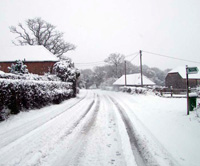Snow threatens livestock supplies as north-east bears brunt of icy blast

The Arctic conditions that have gripped north-east England for almost a week are creating widespread problems for livestock producers.
While auctioneers say numbers of primestock sold this week will be well down – and threatens to cause supply problems in the weeks before Christmas – some sheep producers have been forced to bring ewe flocks inside and a shortage of red diesel could hit parts of the north east by the end of the week.
Colin Smith, auctioneer at Acklington Auction Mart, Northumberland, was making frantic plans today (1 December) to ensure the mart’s Christmas primestock show and sale could go ahead on tomorrow (2 December).
“We’d normally have around 100 head of cattle and between 3000-5000 sheep to sell on a Thursday, but we’ll be lucky to have 60 cattle and 1000 sheep this week – the weather conditions are appalling and it doesn’t seem to be getting any better.
“We’ve been getting around to as many vendors as we can to try and encourage beef farmers to bring cattle in to the sale this week, but the weather has put everyone under pressure and getting in and out of farms is very difficult across big areas of Northumberland.
“We’ve got a lot of butchers who need to buy beef cattle this week to give them enough hanging time for the Christmas trade – so we’re working hard to find enough cattle for them. But the weather is going to reduce the number of buyers we usually get coming up here for these really good Christmas cattle,” said Mr Smith.
While lower stock numbers at markets also means a shortfall in income for livestock producers unable to market their stock, there are also concerns over the price implications if a “deluge” of stock hits the market after the Christmas holidays. But some markets have shown a big jump in prices this week with prime lambs up by 12p-15p a kilo at some centres.
Northumberland farmers have also been responding to requests from local councils to help clear deep drifts of snow that have been making many country roads impassable.
The NFU has received 12 calls from Northumberland farmers with buildings that have collapsed under the weight of snow and growing concerns over red diesel fuel shortages – caused by delivery problems – are adding to farmers’ difficulties particularly in remote areas of around Teesdale.
Farmers who usually sell some surplus fodder during the winter have run out of supplies and merchants are forecasting a steady rise in prices as the increased use of hay, silage and straw bites into stocks that were already well down after the difficult summer weather in the north.
Rachael Gillbanks of the NFU at York said the availability of fodder was a “huge concern” to north-east livestock farmers.
“It’s not only finding supplies, but facing these sudden increases in cost so early in the winter. Sheep farmers with tups still working are also worried that they will face a long drawn-out lambing time and possibly a much lower lambing percentage caused by ewes being under stress at this critical stage of the year for sheep flocks.”
Sue Varley, whose family runs Chestnut Dairies near Hornsea, said that despite having to collect milk from 31 dairy farms, including some in the most remote areas of the North Yorkshire moor, the tanker driver has managed to get through.
“The snow conditions up on the moor are very difficult, but we’re getting through somehow thanks to our tanker driver’s determination not to let anyone down,” she said.
Andrew Potter of Farndale, who supplies Chestnut Dairies, says there have been some “tricky times” over the past few days. On Wednesday he described the view from his farm as a “total white out” with snow still falling heavily and having recorded recent daytime temperatures as low as -13 degrees
“We are about 600ft and there are steep banks and narrow lanes to get to us. The tanker driver has been tremendous and, while he’s been stuck a few times, we’ve always managed to get him into the yard and then get him back out on the road.”
